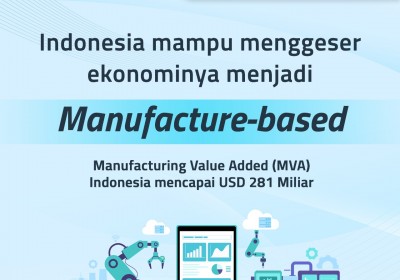Indonesia Focuses on Increasing Added Value to Manufacturing Industry as it Leads ASEAN Economies
October 01, 2021
JAKARTA – With a greater economic scale and a greater variety of industries, Indonesia's manufacturing value added figure (MVA) is higher than other countries around the ASEAN region. Indonesia's MVA is currently at US$281 billion, which enables itself to shift its economy to become more manufacture based.
Indonesia's MVA figure puts itself higher than other ASEAN countries, including Thailand (US$1.23 billion), Malaysia (US$81.19 million) and Vietnam (US$41.7 million).
"Several efforts have been undertaken by the Industry Ministry (Kemenperin) to increase the added value of our industrial sector, such as pushing downstreaming efforts, import substitution programs and aiming for our industry to become a major part of the global supply chain," the Kemenperin's spokesperson Febri Hendri Antoni Arif said in a written statement on Sunday (12/9).
Febri added that the added values achieved by the industrial sector have helped create a multiplier effect, by way of increased job creation, export revenue and contributions to tax and excise. Furthermore, Indonesia's industrial sector is known to have a comparative advantage, namely by its abundant natural resources as well the potential of its skilled human resources that are in their productive age, which can help increase competitiveness of domestic production.
The strength of the Indonesian economy lies in its massive domestic market, while at the same time placing great focus on exports. According to the Kemenperin, this is the factor that separates Indonesia from other ASEAN economies like Singapore and Vietnam.
"Especially given that Indonesia is the only ASEAN country included in the G20. This indicates that Indonesia is globally recognized as one of the largest economies in the world," explained Febri. Indonesia will assume the G20 presidency, as well as host the G20 Summit, in 2022.
Regarding the G20 presidency in 2022, the priority issue in the industrial sector that will be raised is the acceleration of Industry 4.0 methods to foster inclusive and sustainable industrialization, which Febri adds, will support global post-Covid 19 economic recovery efforts.
The adequate supply of raw production materials is considered a comparative advantage for the Indonesian industrial sector. Indonesia's industrial progress is also supported by the improvement of the business climate due to the Job Creation Law passed in 2020. "[The law] is expected to create an industry that produces high added value, is globally competitive and is environmentally friendly," Febri said.
The successful combination of natural wealth and abundant human resources can be seen from several sectors that have posted outstanding performances, such as the wood processing and furniture industry. Overall, the development of global demand for furniture and woodworking products are very promising. Indonesian furniture exports (HS 9401-9403) in 2020 grew to US$1.91 billion, increasing by 7.6% from the 2019 figure of US$1.77 billion.
This places Indonesia in the ranks of major furniture exporters in the world, alongside the likes of China, Germany, Poland, Italy and Vietnam. The largest export destinations for Indonesian furniture in 2020 were the United States, Japan, the Netherlands, Belgium and Germany.
To continue maintaining investment in the furniture sector, the government has helped improve the business climate in Indonesia, especially regarding the anticipation of the provision of main production factors such as raw materials, capital and labor.
In the automotive sector, Indonesia is targeting to become a global automotive export hub, both for fuel-based internal combustion engine (ICE) vehicles and electric vehicles. "We currently have a roadmap to develop electric vehicles that include plans to develop industries that are responsible for producing main electrical vehicle components such as batteries, electric motors and inverters," Febri elaborated.
Global demand for electric vehicles is projected to increase further, thereby pushing up the demand for batteries. The increasing use of batteries also encourages the further production of raw materials, thereby making countries that produce raw battery components such as Indonesia play a vital role in the future.
Indonesia’s Research Institutions Supporting the Development of the Electric Vehicle Industry
Indonesian Muslim Fashion and Cosmetics IKMs Shine at Dubai World Expo 2020
Govt Steps Up UMKM Transformation Efforts in the Midst of Pandemic Slowdown
Govt Encourages Promotion of IKM Products in Digital Era
Government Begins Developing Maritime Training Center in Makassar
Tweets by IDDevForum
